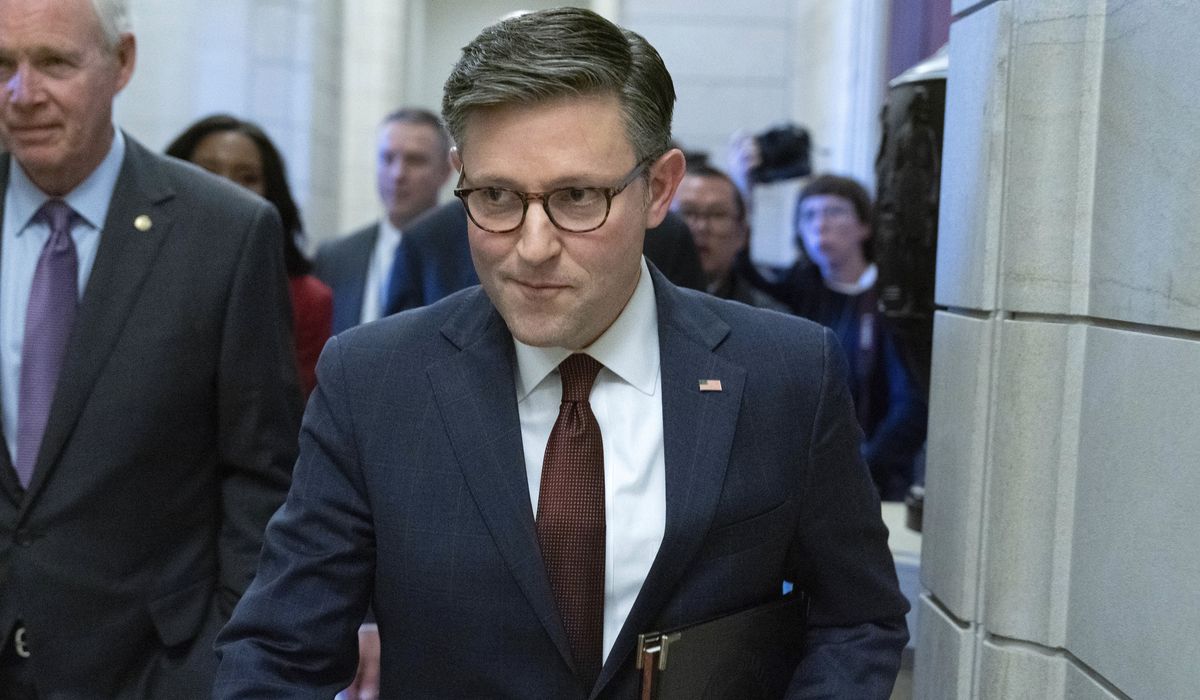

Speaker Johnson tells GOP senators he backs Ukraine aid, but only with southern border security fund

House Speaker Mike Johnson told Republican senators behind closed doors Wednesday that he supports more funding for Ukraine if it’s connected with tougher southern border security, and that aid for Israel should come separately, according to lawmakers in the room.
The meeting offered the Louisiana Republican his first opportunity to officially introduce himself to Senate Republicans amid party divisions over tying aid for Israel and Ukraine to a broader national security package.
Mr. Johnson emphasized the challenges with navigating divisions in his conference, according to GOP senators, and doubled down on his position that a piecemeal strategy to Israel and Ukraine funding requested by President Biden is the only way the Republican-led chamber will be able to pass legislation.
Kansas Republican Sen. Roger Marshall said if Mr. Johnson were to combine such funding, House Republicans “would revolt, and it’d probably be the end of his speakership.”
Republican senators said Mr. Johnson reassured them, including those who oppose his tactic on Ukraine funding, that he is successfully navigating the obstacles within his conference.
“He made it very clear that he understands how critical Ukraine aid is. I felt that he was trying to be helpful,” said GOP South Dakota Sen. Mike Rounds. “He was trying to find a path forward, and I came away encouraged with the fact he is pragmatic in recognizing that we have a different way of looking at it. He’s going to have to find common ground with us, recognizing we have to have 60 votes in the Senate to do anything.”
The House is expected to narrowly approve a standalone bill Thursday to provide $14.3 billion for Israel, using money from the IRS’s boosted budget under Democrats’ Inflation Reduction Act that Mr. Biden signed last year.
Passage is likely to be razor thin, with Mr. Johnson‘s four-seat majority. At least two Republicans — Georgia Rep. Marjorie Taylor Greene and Kentucky Rep. Thomas Massie — oppose more foreign aid to any country because of U.S. debt, while Democrats reject the IRS cuts and want the overall funding tied to Ukraine.
Separating the aid is opposed by Mr. Biden, congressional Democrats and Senate GOP Leader Mitch McConnell, who argue the Senate will require a bipartisan package that includes aid for Israel, Ukraine, southern border security, the Indo-Pacific and humanitarian assistance for the Gaza Strip. They say it’s the only way to overcome the Senate‘s 60-vote threshold.
Mr. Biden has requested a $106 billion package, but Senate Republicans say the proposed border measures would fail to stop the unprecedented surge of illegal crossings. Senators are working on a dueling comprehensive proposal.
But the support of a broad package by Mr. McConnell, Kentucky Republican, has irked fellow GOP senators. Some say Mr. McConnell’s position is undercutting Mr. Johnson’s efforts to unify House Republicans, because it mirrors that of Senate Majority Leader Charles E. Schumer and Mr. Biden.
“There’s questions about the dynamics, which are different in each chamber. I think it’s really important for us to be respectful of that,” said Sen. Eric Schmitt, Missouri Republican. “I would hope my Senate Republican colleagues would afford him that opportunity, as opposed to sort of joining forces with Chuck Schumer to undermine him.”
Mr. Johnson fielded questions from Senate Republicans about an array of topics during their private meeting, including foreign aid and government funding as Congress approaches a Nov. 17 deadline to avert a partial government shutdown.
The speaker said he prefers to pass a stopgap funding measure to run through Jan. 15 so lawmakers can finish the annual budget for fiscal 2024, according to senators. They also said he favored a 1% cut in any spending bill.
Mr. Johnson said the House GOP arrived at the IRS cuts to pay for the Israel aid because it was a readily available tranche of money that could easily be reduced, and the House GOP had uniformly opposed the extra money for the IRS in the first place. The nonpartisan Congressional Budget Office published an analysis Wednesday predicting the slashed funds would add $12.5 billion to the deficit over the next decade because of $26.8 billion in tax enforcement losses.
Republicans dismissed the analysis as inaccurate.
Mr. Johnson was escorted from the House to the Senate prior to the meeting by Republican Sens. Rick Scott of Florida and Ron Johnson of Wisconsin, both of whom side with Mr. Johnson over Mr. McConnell’s approach to foreign aid.
“If we want to get things done, we have to support a Republican majority in the House,” said Mr. Scott, who ran an unsuccessful challenge against Mr. McConnell earlier this year to become GOP leader. “The speaker leads that effort, so I’m going to do everything I can to support him — not undermine him.”
• Alex Miller can be reached at amiller@washingtontimes.com.
• Ramsey Touchberry can be reached at rtouchberry@washingtontimes.com.
